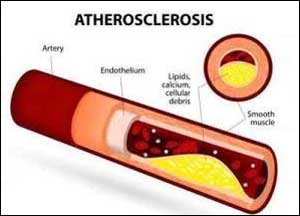- Home
- Editorial
- News
- Practice Guidelines
- Anesthesiology Guidelines
- Cancer Guidelines
- Cardiac Sciences Guidelines
- Critical Care Guidelines
- Dentistry Guidelines
- Dermatology Guidelines
- Diabetes and Endo Guidelines
- Diagnostics Guidelines
- ENT Guidelines
- Featured Practice Guidelines
- Gastroenterology Guidelines
- Geriatrics Guidelines
- Medicine Guidelines
- Nephrology Guidelines
- Neurosciences Guidelines
- Obs and Gynae Guidelines
- Ophthalmology Guidelines
- Orthopaedics Guidelines
- Paediatrics Guidelines
- Psychiatry Guidelines
- Pulmonology Guidelines
- Radiology Guidelines
- Surgery Guidelines
- Urology Guidelines
Lifestyle factors that lead to Atherosclerosis and CV risk,finds study

Lifestyle factors that may lead to Atherosclerosis and increasing the risk of heart attack, stroke, have been pinpointed by a new study.
University of Georgia researchers have found in a new study that which and how lifestyle factors could lead to Atherosclerosis. The study has appeared in the American Journal of Hypertension.
Atherosclerosis is a disease in which plaque builds up inside the arteries. Plaques are made up of fat, cholesterol, calcium, and other substances found in the blood which over time, harden and narrow the arteries. This may limit the flow of oxygen-rich blood to various parts of the body leading to serious problems, including heart attack, stroke, or even death. But the mechanisms that contribute to arterial stiffening are not well understood.
Lifestyle comprises of all the habits which individuals follow regularly over a period of time varying from coffee drinking, alcohol drinking, Southern foods, dietary supplements, and even pesticides that may impact the development of atherosclerosis.
One of the largest of its kind, the study performed an untargeted metabolomics profile of over 1,200 participants of the Bogalusa Heart Study to identify metabolites linked to the hardening of arteries.
That’s where metabolomics can help pull back the curtain on how and when arterial stiffness begins to occur.
Metabolomics is the study of metabolites, which are created each time there is a transfer of energy in the body. Metabolites play a key role in maintaining the body’s normal function, and changes in metabolite levels can reflect how environmental factors, like smoking, diet or pollutants, influence health.
“Metabolomics can accurately measure the amount of exposures entering the body,” said study author Changwei Li.
“In this study, we identified many metabolites related to coffee drinking, alcohol drinking, Southern foods, dietary supplements, and even pesticides,” said Li, an assistant professor of epidemiology and biostatistics at UGA’s College of Public Health.
Using the most up-to-date panel of metabolites, Li and his colleagues ran an analysis on participant blood samples, looking for environmental exposures that had an impact on measures of arterial stiffness.
The study found 27 new metabolites associated with arterial stiffness.
“We were able to identify some environmental and lifestyle related-metabolites, build metabolite networks to shown how the body reacts to the environmental exposures, and more importantly, tested the effect of those metabolites on arterial stiffness,” said Li.
The majority of these were associated with other known risk factors of arterial stiffness like high blood pressure, high cholesterol or diabetes.
But some of these metabolites are food additives and cooking ingredients found in many U.S. kitchens.
For example, the team identified two peptides – gamma-glutamylvaline and gamma-glutamylisoleucine – that are commonly used to enhance the savory taste of chicken broth.
“Our study raised the possibility that those additives may cause arterial stiffness. Given the wide usage of those additives, future studies are warranted to investigate their role in arterial stiffness.”
To be clear, said Li, the current study is a snapshot of metabolites. The relationship between some of the metabolites and arterial stiffness over time is unclear, and he has plans to run this study again using longitudinal data.
The full report of the findings can be found in the current issue of the American Journal of Hypertension at https://academic.oup.com/ajh/advance-article/doi/10.1093/ajh/hpz046/5429584

Disclaimer: This site is primarily intended for healthcare professionals. Any content/information on this website does not replace the advice of medical and/or health professionals and should not be construed as medical/diagnostic advice/endorsement or prescription. Use of this site is subject to our terms of use, privacy policy, advertisement policy. © 2020 Minerva Medical Treatment Pvt Ltd